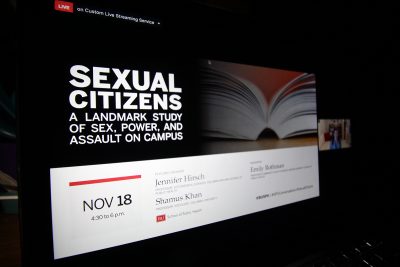Sexual assault is an issue prevalent on college campuses across the nation, and the phenomenon is worsening in recent years.

Despite a number of initiatives working to prevent sexual assault, the frequency of nonconsensual sexual contact among undergraduates has increased from 2015 to 2019, according to surveys from the Association of American Universities.
Boston University’s School of Public Health hosted a panel Wednesday with the co-authors of “Sexual Citizens: A Landmark Study of Sex, Power, and Assault on Campus,” a book that explores the various social factors that result in sexual assault on campus.
Authors Jennifer Hirsch and Shamus Khan discussed their observations and data findings to help point to new approaches in preventing sexual assault. Along with Hirsch and Khan, who led the research, around 30 people contributed to the project.
Hirsch, a professor of sociomedical sciences at Columbia University, said their data draws from research through community engagement, surveys and primarily ethnography. Research from the Columbia project SHIFT — The Sexual Health Initiative to Foster Transformation — also was cited in “Sexual Citizens.”
Part of that SHIFT data collection involved an anonymous student survey, which received a number of responses outside of the survey from undergraduates who wished to tell their stories in full. During the event, Hirsch told the story of a female student who, through participating in this research, chose to confide in Hirsch with a personal experience.
“One young woman, after telling me the story of assaulting her gay best friend, said, ‘I want you to tell President Bollinger [of Columbia] my story,’” Hirsch said. “She really had suffered as a result of causing harm to him, and she wanted her suffering to be used for good.”
Building observations on their collected data, Khan, a sociology professor at Columbia, said terms such as sexual projects, sexual citizenship and sexual geographies are used in “Sexual Citizens” to illustrate how different social factors can influence someone to commit sexual assault.
These individual terms, respectively, refer to reasons for pursuing sex, the right to have or not have sex, and the ways spacial settings influence interactions, Khan said.
“Critically, all of this points to prevention efforts, how we could focus on changing geographies and experience, cultivating sexual citizenship and having people be clearer about their sexual projects in order to reduce or prevent sexual assaults,” Khan said in an interview. “One of the big points of ‘Sexual Citizens’ is that sexual assault is not one thing. It’s many different kinds of things.”
Khan added while gender and power are important aspects in understanding how sexual assault occurs, gender is not the only power inequality that exists — power imbalances can be founded on race, sexuality, class and other factors.
“Every single Black woman that we spoke to told us a story of unwanted sexualized touching,” Khan said. “It’s not just an experience of their gender … that is an experience of racism as well, where their bodies are seen as something that can be touched without consent.”
Khan said sex education is important in combatting the issue. Many people he spoke to during his research, he said, could not recall a time where a family member or older figure talked to them about sex.
“The lessons that young people got was: ‘Relationships can come later, focus on your career,’” Khan said during the panel. “That kind of community denial of a conscious recognition of what a valuable sexual project is and a recognition of the value of people’s sexual citizenship was really important.”
Hirsch said sexual assault prevention should not only be considered a campus-related issue, but rather a community one — those both on and off college campuses should be responsible in preventing sexual assault, she said.
“Instead of focusing on only the interpersonal dimension of sexual assault, we really map out how there’s not one solution,” Hirsch said in an interview. “It’s about bringing everyone to the table to do their part of prevention.”
Yashica Kataria, a founder of Campus Survivors — an Instagram account where people anonymously share their experiences with sexual assault in college — wrote it’s important for the public to understand the dangers of sexual assault.
Kataria, a sophomore in the College of Arts and Sciences, wrote all members of a community need to understand whether their actions contribute to sexual violence.
“Do you let things slide because someone is your friend,” Kataria wrote, “or do you take an active role in supporting survivors to the best of your abilities when you feel comfortable doing so?”
In addressing these concerns, Khan said people need to understand and acknowledge others’ humanity while learning about equality within their communities.
“[The solution] also requires sex ed and an understanding of a moral commitment on all of our parts to recognizing the equivalent humanity and fundamental dignity of everyone we interact with,” Khan said. “Those moral lessons become really important, and it’s part of what we need to do.”
















































































































9-eleven • Dec 10, 2020 at 9:06 am
What’s up to all, the contents existing at this web site are
in fact awesome for people experience, well, keep up the good work fellows.